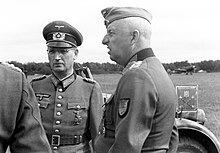Hans Speidel
He served as Commander of the Allied Land Forces Central Europe (COMLANDCENT) from 1957 to 1963 and then as President of the German Institute for International and Security Affairs from 1964.
Speidel participated in the 20 July Plot to assassinate Hitler due to objecting to the racial policy of Nazi Germany, and he was tasked with recruiting Rommel for the resistance.
With the help of religious Pallottines, he was able to escape together with other prisoners and they were able to go into hiding in Urnau in today's Lake Constance district and were taken there by French troops in the last days of the war.
In 1955 he became a director-general in the Federal Ministry of Defence with the military rank of lieutenant-general in the Bundeswehr, and in 1957 he became the first officer to be promoted to full General in West Germany.
During his time in France, Speidel was linked to the mass executions and deportations of Jewish and Communist hostages in reprisal for partisan activities by the French Resistance.
In April 1944, Speidel was appointed Chief of Staff to Field Marshal Erwin Rommel, the Commander-in-Chief of Army Group B, stationed on the French Atlantic coast.
When Rommel was wounded, Speidel continued as Chief of Staff for the new commander of Army Group B, Field Marshal Günther von Kluge.
As Allied forces approached the location where he was held, he slipped from his captors and went into hiding for not longer than three weeks until 29 April 1945, when French troops entered the area.
[7][8] According to an article in Der Spiegel, which cited documents released by the Bundesnachrichtendienst in 2014, Speidel may have been part of the Schnez-Truppe, a secret illegal army that veterans of the Wehrmacht and Waffen-SS established up from 1949 in Germany in order to repel an attack either by the Soviet Union or by Soviet-controlled East German police units.
[9] After the war Speidel served for some time as professor of modern history at Tübingen and in 1950 published his book Invasion 1944: Rommel and the Normandy Campaign before being involved in both the development and creation of the new German Army (Bundeswehr) which he joined, reaching the NATO rank of full general.
In 1960, Speidel took legal action against an East German film studio which portrayed him as having been privy to the assassinations of King Alexander I of Yugoslavia and French Foreign Minister Louis Barthou in 1934, as well as having betrayed Field Marshal Erwin Rommel to the Nazis after the 20 July Plot in 1944.



